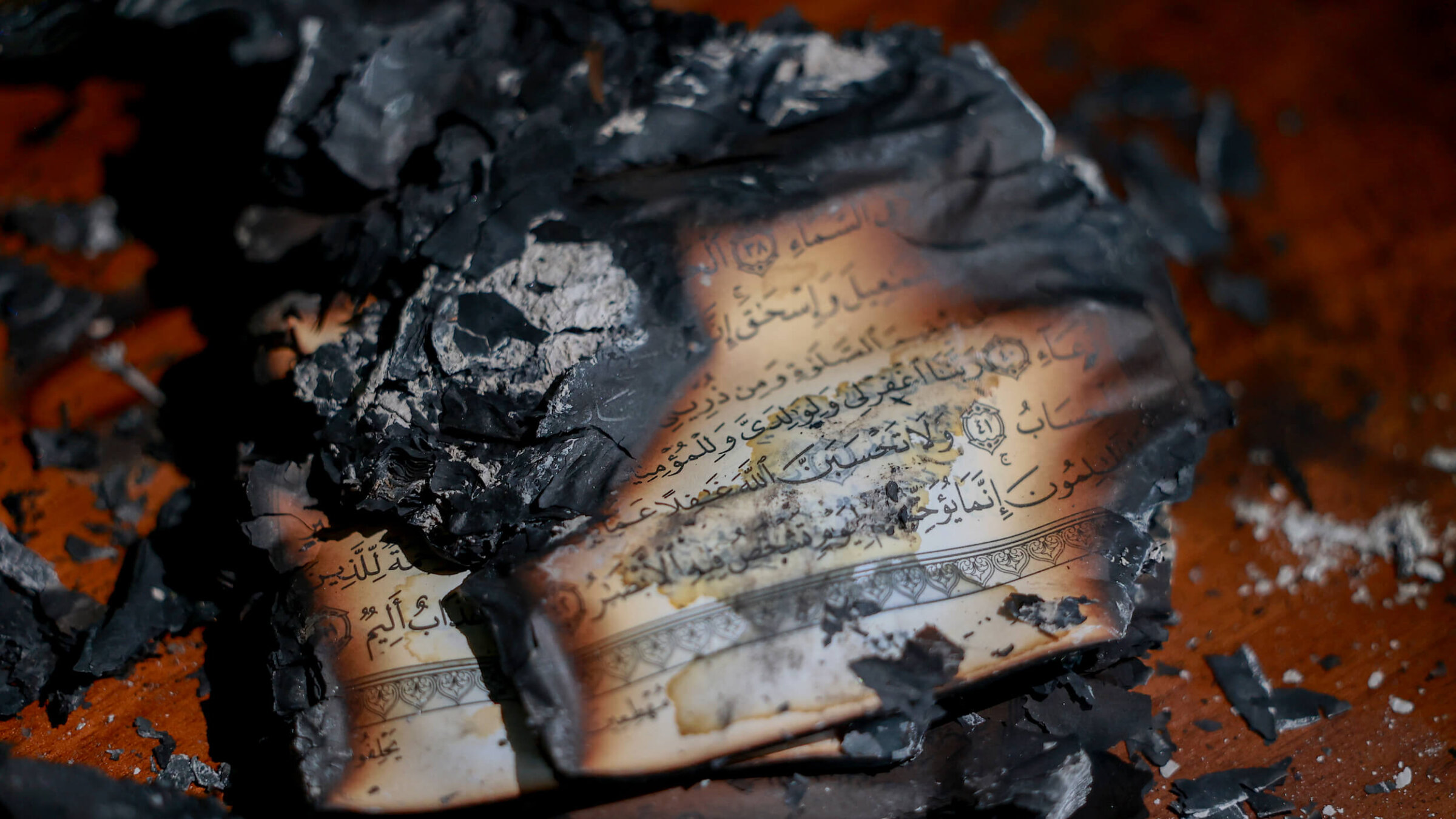Settlers torched a West Bank mosque — and the milquetoast Israeli mainstream response won’t suffice
A crisis is reaching its boiling point, and no one appears ready to take the major steps necessary to restore calm

Burned copies of the Holy Quran are seen inside al-Hajje Hamide Mosque after Israeli settlers set fire to the building and scrawled racist slogans on its walls in the town of Deir Istiya, Salfit, West Bank, on Nov. 13. Photo by Mohammad Nazzl / Middle East Images via AFP
For more than two years, masked settler mobs in the West Bank have torched mosques, burned Qurans, uprooted olive trees, attacked olive harvesters, and rampaged through villages — all with almost no consequences.
Just this week, masked settlers torched a mosque in Deir Istiya, burned Qurans and scrawled hateful graffiti on its walls — only two days after dozens of settlers attacked a village near Nablus, injuring several Palestinians and burning a warehouse. “All state authorities must act decisively to eradicate this phenomenon,” said President Isaac Herzog, calling the strikes “shocking and serious.”
But Herzog would be naïve to expect Prime Minister Benjamin Netanyahu’s government to heed his call. And the West Bank is rapidly turning into an emergency of explosive proportions.
The sharp rise in attacks on Palestinians and their property began in late 2022, when Netanyahu’s calamitous coalition took over, and ramped up with the onset of the Israel-Hamas war. The United Nations counted more than 1,400 incidents between October 2023 and October 2024.
But while the war in Gaza has reached a ceasefire, the violence in the West Bank shows no sign of abating: Independent trackers reported a record 264 settler attacks in October 2025 alone.
Add to that the Israeli military’s own violent record in the West Bank, and the picture is grim. In 2025 alone, the U.N. has documented at least 178 Palestinian deaths linked to settler and military violence.
If you look for the state’s corrective force you will find a yawning gap. In the most chilling scenes — in Huwara in February 2023, and in coordinated attacks on several villages this month — groups of masked young men have attacked Palestinian civilians, while soldiers and police have either arrived late or failed to stop the violence. Israel’s own watchdogs and human-rights organizations document a pattern of non-prosecution that even predates the current government. Yesh Din, which systematically tracks police investigations into Israeli civilians’ violence against Palestinians, shows that roughly 94% of files from 2005-2024 were closed without indictment, and that only about 3-6% of investigation files lead to conviction.
Which raises the obvious question: When attacks are so frequent and prosecutions so rare, who benefits?
Since late 2022, the survival of Netanyahu’s governing coalition has depended on hard-right parties whose leaders and bases overlap with the radical settler movement. Two ministers who matter — Bezalel Smotrich and Itamar Ben-Gvir — are both unapologetic advocates for settlement expansion and the vision of Jewish sovereignty over the West Bank, which they refer to by the biblical name of Judea and Samaria. Ministries and offices that oversee law enforcement in the West Bank — including the Civil Administration and Ministry of National Security — are effectively controlled by figures sympathetic to settlement expansion and skeptical of aggressive policing of their own supporters.
This political reality filters down into operational choices. When enforcement agencies are staffed and supervised by officials who owe their political fortunes to the settlement movement, enforcement will not be robust. Arrests — where they occur — rarely lead to charges that stick. In the first half of 2025, for example, there were hundreds of complaints, but only a fraction were opened as criminal files, leading to scant dozens of arrests.
Why would a democratic government tolerate this?
The answer isn’t just about coalition management. It’s about the government’s fundamental ideological sympathy with settlers, and the absence of a credible alternative plan for the land and people under Israeli control.
For decades, the West Bank settlement project could be dismissed as reversible, or up for bargaining in a final-status negotiation. But every new outpost has served to make a contiguous Palestinian state less viable, bringing Israel closer to incorporating millions of Palestinians — without giving them full citizenship or political rights.
The mainstream right lacks a plan for this demographic reality. But the far right has one: apocalyptic warfare and the eventual removal of Palestinians from the land, an outcome that extremists see as inevitable. That is why people like Smotrich and Ben-Gvir appear indifferent to the destabilizing violence, if not actively encouraging of it: instability is a feature, not a bug, for those prepared to use it to remake reality.
Now, the mainstream right has put itself in a position in which it cannot govern without the far right — so it has ceded moral and policy ground to radicals. The true spirit of Zionism — which is humanistic and humane — is suffering.
Which brings us back to Herzog. President Donald Trump, during his Knesset speech last month, urged him to pardon Netanyahu of all charges that he is currently facing in court. This week he did it again, in a letter claiming that Netanyahu is facing “a political, unjustified prosecution.” Herzog’s office said he held Trump “in the highest regard,” but that anyone seeking a pardon had to submit a formal request — something Trump lacks the ability to do.
I have a better idea. Pardon Netanyahu on the explicit condition that he leave politics altogether, forever. And have a new coalition, free of his corrupting influence and the morally destructive politics of the far right, set to work to clean up his mess.

















